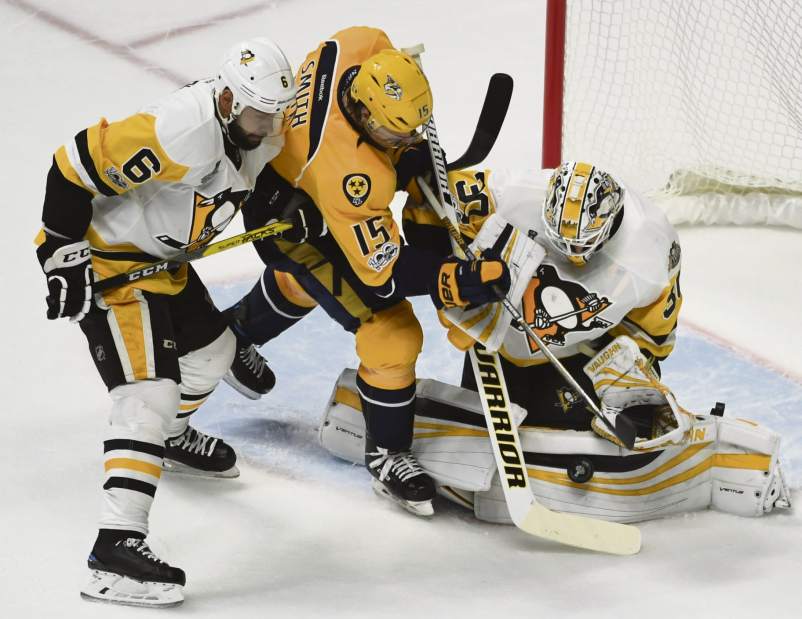Penguins went back-to-back by bucking conventional wisdom
NASHVILLE, Tenn. — While the rest of the hockey world kept close track of what went wrong or awry for the Penguins in the days, weeks and months ahead of the Sunday's Stanley Cup-clinching Game 6, coach Mike Sullivan's club concentrated what mattered most inside the team dressing room: “Playing the right way.”
Lacking Kris Letang for the entirety of the playoffs? Playing the right way overcame that.
Putting Marc-Andre Fleury back on the bench after he delivered two-plus rounds of Conn Smythe-worthy play? The right way treated Fleury and his successor, Matt Murray, as equals.
Relying on rookie Jake Guentzel to lead the team in goals and regularly finishing with fewer shots than the opposition? Just trust what the right way yields.
The Penguins, with a 2-0 win over Nashville in Game 6, became the first team to repeat as Stanley Cup champions since the 1997 and '98 Detroit Red Wings. They did so by defying much of the conventional hockey wisdom they validated in 2016 — dump the hard matchups and minutes on a No. 1 defenseman; stand by a hot goalie after a bad start; look to proven playoff heroes for scoring production; dominate possession. No matter the means, the message and end remained the same.
“We use that phrase, ‘Play the right way,' and it's not just about the details of the X's and O's,” Sullivan said. “It's also a mindset. It's about the resilience. It's about the competitive nature that defines this group. So we use that phrase daily with our team, and it means a lot of things to our group.
“It's hard to just encapsulate what that means to our team in just a few short sentences. But I think our players are well aware of what that phrase means to this particular group. And it applies; it applies to every circumstance.”
Aside from faith in the “right way,” almost everything else about the Penguins' circumstances in the playoffs differed from what they encountered a season ago. Columbus finished with an edge in shots on goal in four of its five first-round games against the Penguins, who only trailed five times in that category all of last postseason. That opportunistic offense trend continued against Washington, even as Sidney Crosby missed most of Game 3 and all of Game 4 with a concussion.
Ottawa confronted the Penguins with a stingy, stubborn defensive system. Nashville followed with a hostile home environment and arguably the best blue line in the league. Unable to regularly impose their will in almost every round, the Penguins instead embraced adaptation and near-constant tweaking of forward combinations.
“You're always trying to find that competitive edge,” Crosby said. “I think that's kind of the nature of the playoffs, of any series — trying to find that way that's going to give you success.”
A defensive corps designed around balance — the six blue-line regulars averaged between 19 and 22 minutes — did enough to help Fleury thrive yet always was active. The veteran netminder impressed as Murray recovered from a lower-body injury during the first two series.
Fleury followed three games in which he turned away 85 of 87 shots and logged two shutouts with an unraveling in Game 3 against Ottawa, during which he allowed four goals on nine shots. That performance opened the door for Murray as starter, and to the surprise of some fans, the second-year netminder never lost the role the rest of the way.
From Letang and Crosby to Murray and Fleury to the most unlikely of the Penguins' Stanley Cup Final lineup fixtures, undrafted 28-year-old rookie Carter Rowney, the need for conventionality or anything resembling the 2016 run never arose.
“These guys have an appetite to win,” Sullivan said. “I also think they have great aptitude for the game and have the ability to adjust and find ways to have success. I think it says a lot about the players that we have and the character of the people that they are.”
Bill West is a Tribune-Review staff writer. Reach him at wwest@tribweb.com or via Twitter @BWest_Trib.

